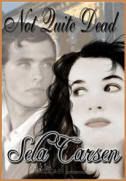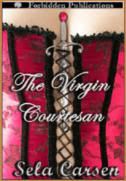Length Challenged
Hi, my name is Sela and I'm a short writer. No, I'm not short, I just write that way.
I'm not sure why.
Maybe it's the journalism background. If you're lucky and you've got a good story, you can get up to 18 inches on a front page article in a paper.
Maybe it's the advertising background. You've got one sentence to sell this product. Make it punch.
Maybe it's because I have the attention span of a mentally deficient gnat.
You know, short stories and novellas used to be THE thing. In the 18th and 19th centuries, the genre of the short story was defined by the medium. Kate Chopin, Edgar Allan Poe and O. Henry were continually published in magazines and newspapers. As Romanticism took over, however, the novel gained pre-eminence.
During the early and mid-20th century, magazines again became popular -- specializing in the nooks and crannies of life. Lots of genre specificity. Isaac Asimov *made* science fiction in the 1940s and 50s by his contributions to magazines. Shirley Jackson wrote consistently on the twists of small-town life as well as humor during the same time. William Faulkner wrote 20 novels and over 120 short stories during his career, most of the shorts published in the 1930s. James Thurber wrote short stories and essays for The New Yorker, in addition to being a cartoonist. There were outlets for short fiction
Katherine Mansfield never even wrote a novel. Her official website states, "She said herself that she could never write 'a whole novel about anything.'"
The novella is a different creature, however. The oldest novella collection is The Decameron by Boccaccio. The Canterbury Tales by Chaucer are also novellas, as are the works of Marguerite de Navarre (The Heptameron -- 72 tales) and a group of stories by Miguel de Cervantes called Novelas ejemplares. All Renaissance writers.
Germans laid claim to fashioning the novella as a literary genre in the 19th century. Goethe wrote a collection of tales called Conversations of German Emigrants. A point of connection between Goethe and Boccaccio is that each novella is presented within a larger narrative framework. Each book is about a group of travelers telling stories to pass the time.
Man, even then you couldn't sell a novella on its own!
The cost of printing a single novella far outstrips the potential profit for publishers these days. Anthology sales are lower than single title sales, so they don't often take chances on new authors. Brava, an imprint of Kensington, is the exception to this rule in the romance world. Newspapers no longer publish fiction (please hold your raspberries) and with the demise of the literary magazine, where is the new frontier for short genre fiction?
E-publishing.
Many romance e-pubs accept short stories and novellas. Samhain's minimum length is 12K, Ellora's Cave wants at least 10K for some of their lines. The Wild Rose Press even has a line called "Rosettes" for stories that are under 5,000 words.
Wild Child Publishing accepts shorts and novellas of any genre, including poetry, for their magazine. Their e-books, however, have a minimum length of 50K. Freya's Bower is their sister site and they'll accept anything 6,000 words and up. Changeling Press only wants short stories and novellas. They won't even accept anything over 25K words.
And those are just the romance publishers! Ok, to be fair, most of them cross genres, but receive most of their revenue from romance sales. I looked around for spec fic publishers and found Double Dragon Publishing. They have a lot of sff and accept any length at all. I spotted one of their Dollar Downloads that was only 7 pages long.
So there are still places for us, the short writers. We just have to be clever about where we go now. We have to lure the readers to us with more craft. If we write short, we'd better damn well write tight, too.
10 Comments:
ROFL! I just whined on my blog about not being able to write short, much as I'd love to. The grass is always greener, isn't it? :D
By , at 11:52 PM
669. Not that bad. :p
Brat!
By Sela Carsen, at 8:56 AM
Good post!
I've always loved writing shorts too. Love the immediacy, the impact, the fine crafting it takes.
Unfortunately, as you say, there are few markets now, which always puzzled me since people have less time for reading and shorter attention spans. I suppose the limited profit is probably the reason. Dammit.
By , at 11:18 AM
Shorts are nice. But it's getting into the mind-frame that's the hard part. You may be as intelligent as all- get- out, creative even, but if the short story is not ready to tell itself,if you hadn't winnowed the air for inspiration and coincidence, if the Universe is against you on a particular day, you won't be able to write the story.
So it was odd that one blogger, H.E Eigler suggested a story about an animal in trouble, and wham, out of the blue, complete to the last detail came my story about an old goat and his romantic ruminations and slightly lame pursuits. Hah.
Seemed as if H.E. Eigler hit the right inspiration button for me.
I haven't been able to write a decent thing since.
Something to be said for The Lady to inspire the knight?
I am probably a hopeless romantic.
Doorstoppers are usually written by people known for other pursuits besides writing.
Me, I think I want to be a beauty queen on drugs. Heh.
And that's what you're so very talented at doing Sela! You will always find a market for your sryle and writing.
By , at 1:20 PM
Raine, I don't understand it, either. Maybe it's because if people figure they're going to plunk down ever more cash for a book, they by gosh want something that makes them feel like they're getting a lot for their money!
Well, Ivan has given me something to mull for a future blog post. Why are some of us better at writing short and why can some of us not put on the brakes? Just a study of differences.
And sorry, the beauty queen on drugs routine has already been taken!
S Will, I don't know why the rules don't apply in some cases. Ivan's got a point about the doorstoppers being "other than" authors, but I don't think that's all of it. Different genres are more forgiving of different lengths, I think. SF readers seem to love worldbuilding minutiae, so they can go on for 800 pages with no problem. I think I prefer Asimov.
Lisa, I hope so! I'm swamped at the moment and I waver between being gleeful that others like my writing and completely panicked that I'm not going to get it all done on time!
And if my firewall wasn't such a bee-yotch, I'd be able to fix those extra comments. Bloody Zone Alarm.
By Sela Carsen, at 2:16 PM
Yay! I fixed it!
By Sela Carsen, at 2:17 PM
A blessed Christmas, Sela.



